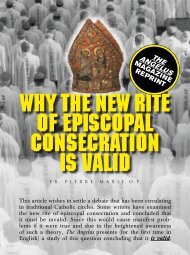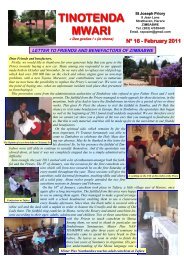Is Feeneyism Catholic? - Society of St. Pius X
Is Feeneyism Catholic? - Society of St. Pius X
Is Feeneyism Catholic? - Society of St. Pius X
Create successful ePaper yourself
Turn your PDF publications into a flip-book with our unique Google optimized e-Paper software.
8 I S F EENEYISM C ATHOLIC?<br />
without Baptism <strong>of</strong> Water, but also without Baptism <strong>of</strong> Blood,<br />
one receives the effect <strong>of</strong> Baptism by the power <strong>of</strong> the Holy<br />
Ghost (Summa Theologica, [hereafter ST] III, Q.66 A.11).<br />
The same is true after baptism. If one loses sanctifying grace<br />
by a mortal sin, he ought to go to confession, repent for his sins,<br />
accuse them to the priest, receive the absolution and do the penance<br />
given by the priest. Yet, God can restore sanctifying grace in<br />
this soul even before the actual reception <strong>of</strong> the sacrament <strong>of</strong><br />
Confession, by the soul’s act <strong>of</strong> perfect contrition: perfect contrition<br />
is for the sacrament <strong>of</strong> penance what baptism <strong>of</strong> desire is for<br />
the sacrament <strong>of</strong> baptism.<br />
GOD DOES SOMETIMES WORK SUCH MIRACLES<br />
That some receive sanctifying grace before baptism <strong>of</strong> water is<br />
not only a possibility, it is a fact! <strong>St</strong>. Augustine speaks <strong>of</strong> <strong>Catholic</strong><br />
catechumens “burning with charity,” giving the example <strong>of</strong> the<br />
Centurion Cornelius (Acts 10:44,47) who was “filled with the<br />
Holy Ghost before his baptism.” 8<br />
ONE WHO HAS RECEIVED SANCTIFYING GRACE<br />
BEFORE THE ACTUAL RECEPTION OF THE SACRAMENT<br />
IS NOT DISPENSED FROM THE LAW OF GOD,<br />
OBLIGING HIM TO RECEIVE THE SACRAMENT<br />
This law still applies to him. As a matter <strong>of</strong> fact, he would not<br />
have the grace <strong>of</strong> God unless his will were submissive to the Will<br />
<strong>of</strong> God, thus including (implicitly or explicitly) the will to receive<br />
the sacrament. This is true <strong>of</strong> baptism <strong>of</strong> desire. It is true also <strong>of</strong><br />
perfect contrition: it does not dispense from confession, it cannot<br />
even be had without the will to go to confession as soon as possible.<br />
It is important to stress here that baptism <strong>of</strong> desire is more<br />
than the mere desire <strong>of</strong> baptism, in a similar way that perfect contrition<br />
is more than the mere desire <strong>of</strong> confession. In both cases,<br />
the former includes the full spiritual life (sanctifying grace with a<br />
“living faith,” “working through charity,” with detestation <strong>of</strong> all<br />
8 De Baptismo, 4, 21, 28, Rouët de Journel, Enchiridion Patristicum, No.1629<br />
(henceforth referenced as “R.J.”).











